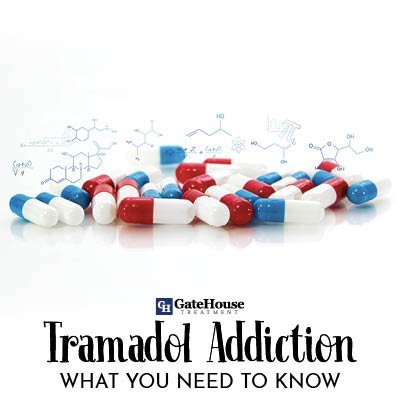
The Controlled Substances Act was signed by President Nixon in 1970, and changes are constantly being applied as new dependent drugs are evolving over time. The five types of controlled substances include Narcotics, Depressants, Stimulants, Hallucinogens, and Anabolic Steroids. With all eyes recently on the opioid epidemic, it’s surprising that there isn’t more talk about the dangers of Tramadol Addiction. When a new prescription painkiller medication comes out, it’s potential for abuse is always questioned. Tramadol is an opioid medication used to treat pain; it’s also sold under the brand name Ultram. Many people still don’t think that Tramadol has the potential for abuse or can be addictive because it wasn’t classified as a Schedule IV drug nationwide until 2014. While Tramadol does have a much lower chance of being abused, Tramadol is addictive.
Tramadol Addiction Symptoms
Similar to other opioids that are abused, Tramadol addiction usually presents the same symptoms of abuse as other prescription painkillers like Oxycontin, Percocet and Dilaudid. Many people believed that Tramadol wasn’t as addictive as other prescription pain medications, and developed an addiction without realizing it. The addiction symptoms can include:
- Constricted (tiny) pupils
- Extreme drowsiness
- Slurred speech
- Nausea or vomiting
- Constipation
- Dry mouth
- Headaches
- Nodding out
- Euphoric moods
- Lack of pain
- Itchiness
Tramadol is a controlled substance, and it can be abused if taken frequently enough. It is possible to overdose, especially if it is used in conjunction with other drugs (called polydrug abuse) trying to achieve a certain effect. If Tramadol is taken with other opioids, prescription or not, it increases the chances of an opioid overdose.
The way Tramadol works in the brain besides its effect on the opioid receptors, (which is weak compared to other opioids) Tramadol affects the norepinephrine and serotonin neurotransmitters. With Tramadol’s effect on these neurotransmitters, it can produce seizures when taken in higher doses than what is prescribed.
Tramadol Withdrawal Symptoms
People who continuously take Tramadol to the point where they develop a dependence will have withdrawal symptoms when they stop taking it. Tramadol works on different parts of the brain than most opioids, and also has some unique withdrawal symptoms that are similar to antidepressant discontinuation syndrome. Symptoms of Tramadol withdrawal can include:
- Nausea
- Diarrhea
- Abdominal cramping
- Sweating
- Anxiety
- Muscular/bone aches and pain
- Restlessness
- Insomnia
- Runny nose
- Watery eyes
- Excessive sneezing
Some of the withdrawal symptoms unique to Tramadol are:
- Severe anxiety
- Confusion
- Delusions
- Paranoia
- Numbness/Tingling in limbs
- Hallucinations
- Tinnitus (ringing in ears)
- Loss of appetite
- Agitation
- Depression
While these withdrawal symptoms are unique to Tramadol because of the way it acts in the brain, a Tramadol overdose presents specific difficulties that other opioids don’t. With Tramadol’s unique effects on the brain, it makes treatment with Naloxone, (opioid overdose medication) less effective than usual.
Tramadol Addiction Treatment
Tramadol abuse is steadily increasing because of the longevity that people are taking Tramadol. 64% of patients prescribed Tramadol continued taking it after a year. If you believe that you or a loved one are abusing Tramadol or have an addiction to it, there are treatment options available for you. Just as with all opiates, a medical detox is recommended. Especially with Tramadol having such unique withdrawal symptoms, it is best to go to an addiction treatment center to be detoxed by medical professionals.
Patients detoxing from Tramadol should remain in drug rehab for a longer time to learn how to cope with life in sobriety. With the unique side effects that Tramadol produces in user once they stop taking it, relapse can happen very easily because of the mental health symptoms. Detoxing from all drugs effects the brain, and users typically experience depression when first coming off any substances. Those suffering from Tramadol addiction may feel more depressed than others with substance use disorders because of how it can mimic antidepressants in the brain.
If you or a loved one are ready to overcome a Tramadol addiction, contact us today at (855) 448-3588. GateHouse Treatment can help you overcome any addiction and live a fulfilling life in sobriety.
- Cymbalta Withdrawal: Causes, Symptoms, And Management - October 12, 2023
- Boredom in Recovery: 5 Tips to Avoid Relapse - October 6, 2023
- Overconfidence and Rehab: Avoiding Relapse - October 4, 2023




